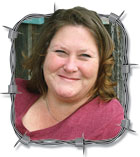Monte Ritchie – Part II
Frank recalls one of his great interviews with the Texas Rancher Monte Ritchie. He's been intimidated by Monte on his visit to Monte's JA Ranch, but things have only begun to get good…
The next morning Ritchie and his cowpunchers rode off on their roundup. In his black hat, his fringed “shotgun” chaps, his boots and jingling spurs, Monte made a fascinating figure. He rode as if his tailbone was screwed in the saddle. If a wild cow stampeded along the brink of a yawning canyon, Monte was right there to turn her back.
A few days later he consented to let me ride with the men. All went well until time to pen the herd we’d gathered that morning. Then Monte, rode past me and, in coldly formal voice, said, “You ride at the back of the herd. I don’t want you spooking the herd when we pen it.”
I felt the hot flush leap to my face. Though I was no old cowhand, I wasn’t exactly a dude, and his curt order cut my pride. It reopened the gash of hate I’d known since meeting him, although the past few days it had seemed ready to die away. With stiffened back, I rode to the drag. I watched Monte dash back and forth on his magnificent black horse, giving orders. I began to feel distinctly inferior. His tongue, sharp as the needle grass that grew underfoot, had got in its work. He seemed to grow to the stature of a feudal lord, this sharp-eyed man of Texas with the thousands of cows, hundreds of horses and millions of dollars.
At this time, I had not yet interviewed him personally. In such a case as mine, a personal interview was a necessity. Yet, the manner in which he seemed to tower far above me in ability and intellect and material wealth almost froze me numb.
I put it off as long as possible. The longer I put it off, the more frantic I became. I decided I would bypass the personal interview and take my leave as soon as possible. Then, the next to the last day I was to be on the ranch, Monte cornered me. “I’d like to have you for dinner Monday night,” he said. “Facts have a habit of getting twisted. I want to set you straight.”
My heart hammered. I dreaded to think of the evening. “Monday morning we are taking the cattle to the canyon for winter pasture. I want you to go along. We’ll have dinner at 8 o’clock Monday evening.”
With that he walked firmly away. The set of his back told me the futility of argument.
Sunday passed into golden hours filled with red and white cattle, fine horses and delightful cowboy tales. On Monday morning Ritchie accosted me at the roundup grounds. I saw the frown on his face. “Where the devil were you last night?” he demanded.
Startled, I said, “What do you mean, last night?”
“You were supposed to have dinner with me, remember,” he said sarcastically. “Where were you? Around those fleshspots up in town?”
That did it. My back was to the wall. I growled, “No. Monday was the night.”
He brushed aside my correction as though it were an apology. “I waited for you until 10 o’clock. Mrs. Hicks was very angry. I want you to come tonight for dinner. But you must apologize to her for not coming last night.”
I started to continue my protest, but turned away, conscious of the futile feeling that I was not man enough to face up to iron-jawed steel-willed Monte Ritchie.
That night Monte was again the gracious host. We sat down at the table and he rang for the cook. Mrs. Hicks came in. Ritchie cleared his throat. Dutifully, as though I had a string on my tail, I said, “Mrs. Hicks, I hope it didn’t put you out too much last night when I didn’t show up.”
Mrs. Hicks, burly, gruff, voluble, put hands to hips and said, “It wasn’t anything unusual. I told Mr. Ritchie that you were supposed to come Monday night instead of Sunday night. But he wouldn’t hear to it. Don’t you think anything more about it.”
My eyes cut around to Monte’s. His face beamed red. He fingered his mustache. "Now, now, Mrs. Hicks," he said soothingly. "Don't get upset. It was all a mistake. I'll be sure it won't happen again."
Something happened inside me. My nerves stopped their stampede. My eyes refocused on Monte Ritchie, and I saw him now, not as some superman, but one whose faults included the sometimes-one of forgetting to tell his cook when company was coming to dinner.
The rest of the evening proved to be mutually enjoyable. I had discovered a fault, if it may delicately be called that, in a man whom I actually had intense admiration for. And I had discovered one in myself. I'll try never to be intolerant again.






